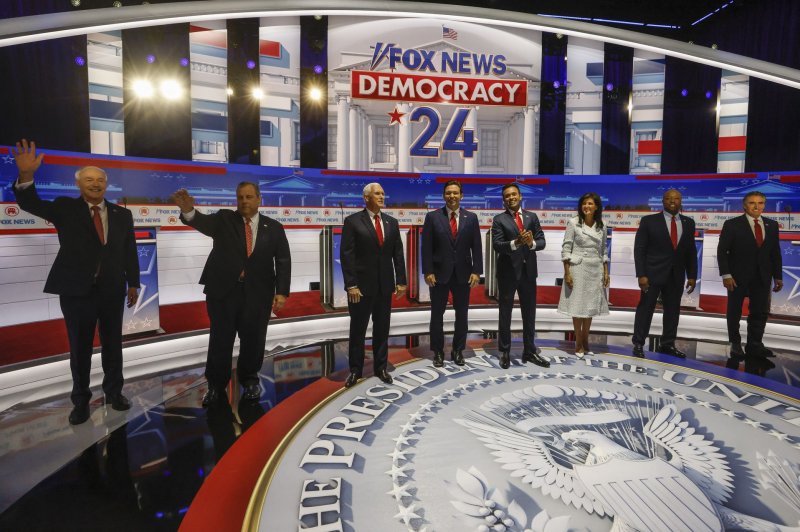1 of 5 | Republican presidential candidates take the stage at the first primary debate of the 2024 campaign at Fiserv Forum in Milwaukee on August 23. Photo by Tannen Maury/UPI |
License Photo
CLIVE, Iowa, Sept. 14 (UPI) -- Months into the Republican presidential primary campaign, the candidates' policy proposals are coming into focus, with several indicating they would ax the U.S. Department of Education and challenge teachers unions.
Education policy has become among the most polarizing political battlefields leading up to the 2024 election. Three years removed from teachers being praised during the height of the COVID-19 pandemic, candidates like Florida Gov. Ron DeSantis and entrepreneur Vivek Ramaswamy have blasted educators at large for "indoctrinating children."
The candidates may not align on every facet of how to shape the future of education, but they are largely in agreement on a few significant proposals.
One such proposal is eliminating the DOE. Ramaswamy, an entrepreneur, led this charge at the primary debate last month, joined by former Vice President Mike Pence, DeSantis and North Dakota Gov. Doug Burgum.
"Let's shut down the head of the snake, the Department of Education," Ramaswamy said from the debate stage in Milwaukee. "Take that $80 billion, put it in the hands of parents across the country. This is the civil rights issue of our time."
Cutting the department would not be as simple as an executive order by the president. It would require legislation to pass through Congress. Such legislation has been proposed as recently as February. Past iterations have not gained the support needed to pass.
Kim Anderson, executive director of the National Education Association teachers union, worries what would happen with programs like the Individuals with Disabilities Education Act, federal borrowers and students who benefit from Title 1, which provides funding for low-income families.
"It's baffling to me why they would assume that making fewer investments or diminishing our support for students at every level of the government somehow adds up to a better public education system," Anderson told UPI. "It doesn't."
Support for voucher programs or private school savings accounts has gained steam among Republican policymakers. Republican-led states including Iowa, Florida, Indiana and Utah have enacted such programs to allow public funds to be used at private or parochial schools.
The Republican candidates have largely spoken in favor of what they call "school choice" across the country. Former President Donald Trump proposed adopting a "parental Bill of Rights" that would establish "complete curriculum transparency" and universal school choice.
Recent school board elections across the country may indicate that most people support funding public schools, or even reject allocating funding to private school programs.
According to polling by NEA, the public shares many of the same concerns.
NEA's polling, conducted by GBAO Strategies, showed that a large majority of those surveyed see teachers and public schools favorably.
More than 80% of what the survey calls "pro-public education candidates" won their 2023 school board elections in Montana, Illinois, Missouri and New York.
Opponents of school vouchers and similar programs argue that they direct resources away from public schools that are already underfunded.
Anderson suggests that it was more than school vouchers that were rejected in those elections. It was also a rejection of the various culture wars candidates like Ramaswamy, DeSantis and Trump have waged when talking about education.
While they have campaigned on confronting so-called "woke ideology," stagnating wages are the top concern for educators.
Ramaswamy, along with S.C. Sen. Tim Scott and former New Jersey Gov. Chris Christie, also vowed to end teachers unions. Christie has been discussing it for more than a decade.
In a 2015 interview with CNN's Jake Tapper, Christie said the national teachers union deserves a "punch in the face."
"Because they're not for education for our children. They're for greater membership, greater benefits, greater pay for their members," he said. "They are the single most destructive force in public education in America. I've been saying it since 2009. I'm never going to stop saying it."
At the debate, Scott echoed Christie's words, saying the only way to change education in the United States is to "break the backs of teachers unions."
The role of teachers unions, as Anderson describes, is to bargain for higher salaries and better benefits for teachers, but also to advocate for learning experiences for students.
Randi Weingarten, president of the American Federation of Teachers, condemned the criticism.
"When Tim Scott and Chris Christie attack teachers unions, they're attacking teachers. Teachers unions exist to give teachers a voice so that they can do their best for kids," Weingarten tweeted during the debate. "We should be helping teachers, not making it harder for them to do their best for kids."
Anderson said the talking points across the Republican campaigns don't address the needs of educators and students. She said the average teacher is putting 15 hours of work in a week without compensation and is concerned about safety and additional mental health resources for teachers and students alike.
"It's putting an extraordinary amount of weight and trauma on educators," she said. "The public fundamentally understands 90% of children go to public schools. The public understands that vouchers drain resources from their kids. Unfortunately, these kinds of wedge issues are designed to both privatize education, as well as win political races."















